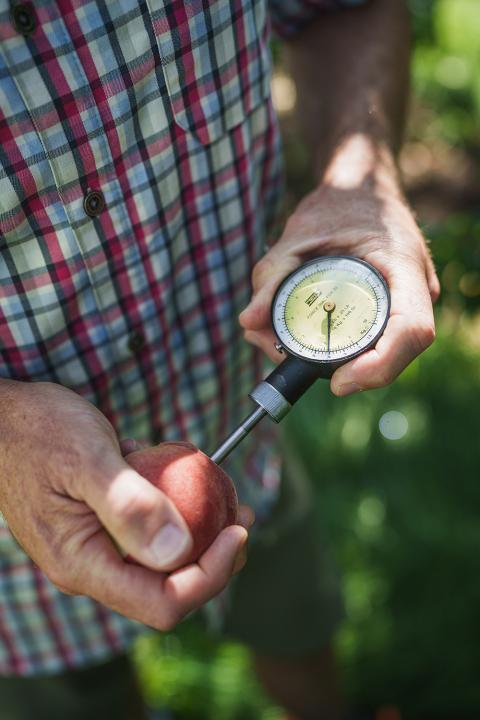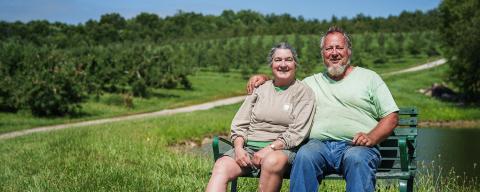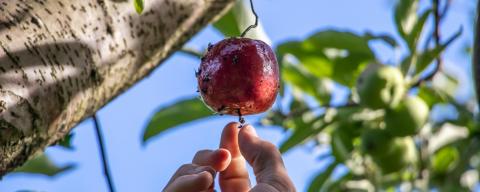Just Peachy
From sweet and tart to delicate and floral, there’s nothing quite like a juicy peach during the dog days of summer.
Although the scale of production for peaches in New Hampshire is far less than that of apples, it’s increasing every year. Extension is supporting growers by researching peach and nectarine varieties. Which are most cold-hardy? Least cold-hardy? Tastiest? Prone to skin tearing or cracking?
These are some of the questions that have guided a three-year study conducted by Extension specialist Jeremy DeLisle alongside farmers Chuck and Diane Souther at Apple Hill Farm in Concord.
Longtime farmers, the Southers operate a pick-your-own business (strawberries, blueberries, raspberries, black currants and apples) and a farm stand that sells a wide variety of fruits and vegetables. The farm also produces homemade products like jams, jellies and pancake mixes for sale at retailers and farmers markets.
The Southers initially teamed up with former Extension specialist George Hamilton, who secured funding from the Essex County Fruit Growers Association in Massachusetts to plant trees in 2018.
Upon Hamilton’s retirement in 2021, Delisle took over the trial. He has focused on quality assessment and evaluation of the fruit itself — aspects like bloom time, harvest dates, color, flavor, sugars and susceptibility to disease.

Extension specialist Jeremy DeLisle
UMaine Collaboration
An important aspect to this trial came from partnering with Renae Moran, a tree fruit specialist with the University of Maine Cooperative Extension.
DeLisle explains, “The collaboration with Renae and the University of Maine greatly improved the benefits of this trial. Her research background and specialized equipment allowed for incremental hardiness testing across a range of temperatures, contributing to a better understanding of which varieties are hardier than others.”
This partnership also allowed DeLisle to “focus on the aspects of harvest windows and quality characteristics, providing growers with additional information when selecting suitable varieties for their markets.”
The collaboration began after the two specialists connected through Zoom during the COVID-19 pandemic.
Moran was waiting for peach trees in Maine to grow to an age when they could be tested in the lab when she found out about the research in New Hampshire. It takes at least three years for peach trees to reach a size where shoots can be sacrificed for testing.
“Apple growers have been experimenting with new peach varieties for more than 10 years, but with little knowledge of which varieties will survive in Maine or New Hampshire,” Moran says.
“There have been some failures that cost growers money when trees failed to bear fruit from lack of winter hardiness and when the variety promoted by the nursery turned out to be a dud. That is why Jeremy and I started variety trials — to take the guesswork out of peach growing.”

Checking the pressure of the peach
Findings
Moran will be publishing a report this year and both Extension organizations are sharing findings from their trial with growers. Of the 33 varieties tested, the yellow-fleshed peaches Redhaven and Contender were the most cold-hardy. The least cold-hardy included Galaxy, Flamin’ Fury® PF 5D Big, Scarlet Rose™ (NJ355 Cv.), Spring Snow and Sugar Giant.
This information will help growers understand what varieties are best to plant — saving time, money and the headaches that come with a failed crop.
Peachy Keen Varieties
Cold-hardy
- Redhaven
- Contender
- John Boy®
- Flamin’ Fury® PF 17
- BuenOs™
- TangOs®
- SilverGem® nectarine
Flavorful
- Desiree®
- TangOs®
- Cresthaven
- Coralstar®
- John Boy®
- Messina®
- SilverGem® nectarine
Extension Services & Tools That Help NH Farmers Grow
Newsletters: Choose from our many newsletters for production agriculture
Receive Pest Text Alerts - Text UNHIPM to (866) 645-7010


